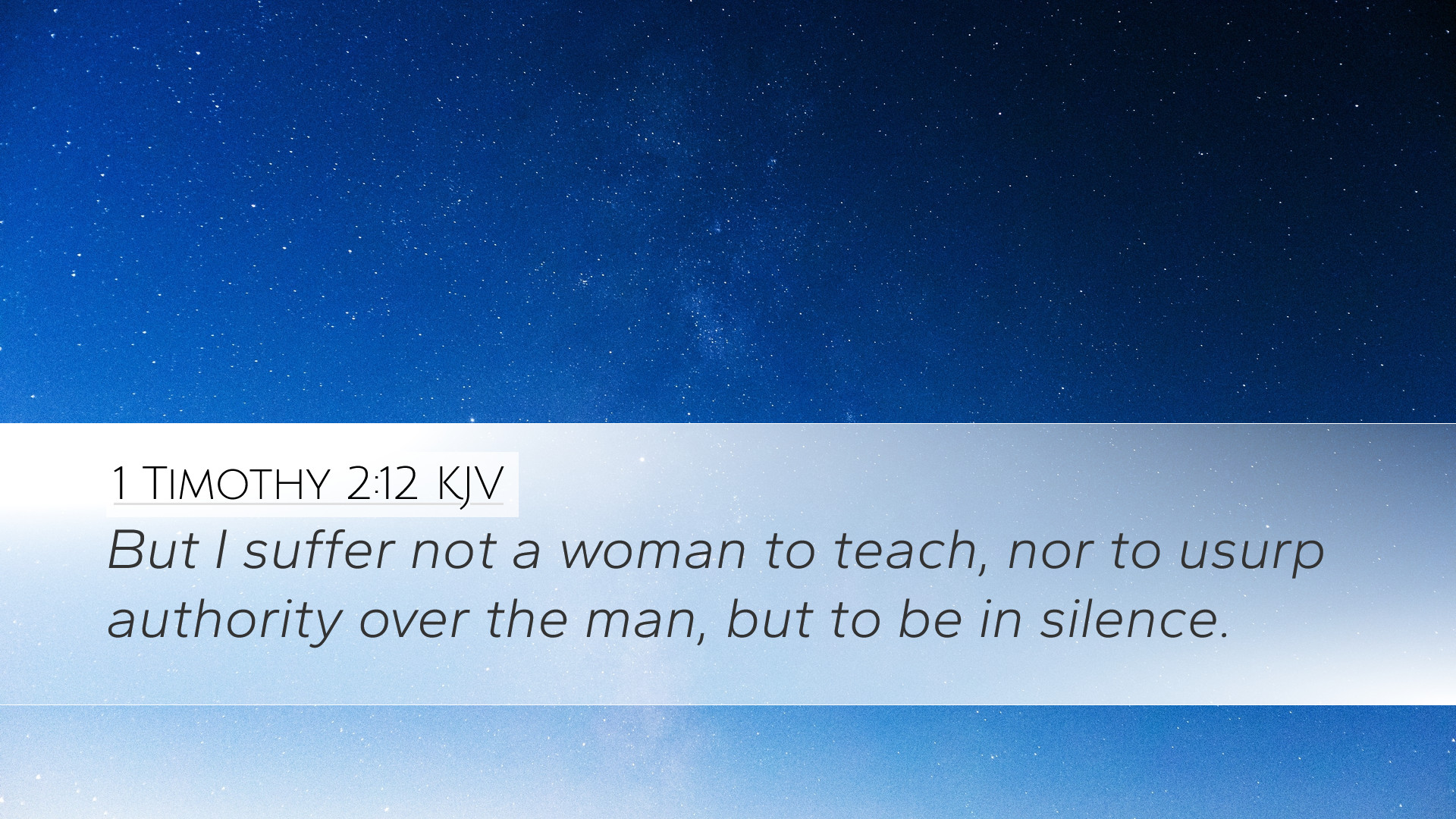Old Testament
Genesis Exodus Leviticus Numbers Deuteronomy Joshua Judges Ruth 1 Samuel 2 Samuel 1 Kings 2 Kings 1 Chronicles 2 Chronicles Ezra Nehemiah Esther Job Psalms Proverbs Ecclesiastes Song of Solomon Isaiah Jeremiah Lamentations Ezekiel Daniel Hosea Joel Amos Obadiah Jonah Micah Nahum Habakkuk Zephaniah Haggai Zechariah Malachi1 Timothy 2:12
1 Timothy 2:12 KJV
But I suffer not a woman to teach, nor to usurp authority over the man, but to be in silence.
1 Timothy 2:12 Bible Commentary
1 Timothy 2:12 Commentary
Bible Verse: "But I suffer not a woman to teach, nor to usurp authority over the man, but to be in silence."
Introduction
This verse from 1 Timothy 2:12 has generated significant discussion and debate within Christian circles. The Apostle Paul’s directive here is focused on the roles and responsibilities of women in the church and its impact on ecclesiastical authority. It is crucial to examine this verse in its context, taking into account historical, theological, and cultural perspectives.
Historical Context
Understanding the cultural and historical context of the early church is pivotal for interpreting Paul's instructions. In the first-century Greco-Roman world, gender roles were distinctly defined, and women had limited authority in public life. Paul’s writings must be viewed against this backdrop of societal norms regarding gender and authority.
Commentary Insights
Matthew Henry’s Commentary
Matthew Henry elaborates on this verse by emphasizing that Paul is addressing the order of the church and the preservation of peace and order within its governance. He interprets “teach” as pertaining to authoritative teaching that implies a position of influence over men. Henry warns against disorder that arises when this biblical injunction is neglected.
Albert Barnes’ Commentary
Albert Barnes offers a more nuanced perspective, suggesting that Paul’s prohibition is not an absolute restriction, but rather specific to the church at Ephesus where false teachings and ascetic practices were prevalent. Barnes points out that this directive aims to protect sound doctrine and emphasizes the importance of women participating in the faith within appropriate bounds.
Adam Clarke’s Commentary
Adam Clarke provides a detailed exegesis, stressing the interpretation of “usurp authority.” Clarke notes that the Greek term used implies a domineering spirit, which Paul opposes. He emphasizes that in the context of the church, men are expected to lead based on scriptural authority, while women are encouraged to teach other women and children, contributing to the church in meaningful ways without violating the outlined structure.
Theological Implications
This verse has led to varying theological interpretations ranging from complementarian views, which support distinct roles for men and women in church leadership, to egalitarian perspectives promoting equal opportunities for all genders in ministry. This discussion hinges on the understanding of scriptural authority, the role of women, and the significance of church governance.
Contemporary Application
The application of this verse in contemporary church settings demands careful consideration. While some argue for strict adherence to Paul's instructions, others advocate for contextual interpretations that recognize the contributions of women in ministry today. It raises important questions about how church leadership is structured, the nature of authority, and how congregations can promote inclusivity while remaining faithful to scriptural teachings.
Conclusions
In conclusion, 1 Timothy 2:12 serves as a crucial passage that invites deep reflection among pastors, students, theologians, and Bible scholars. It challenges the faithful to balance scriptural authority with the evolving role of women in the church while remaining committed to sound doctrine and unity within the body of Christ.


